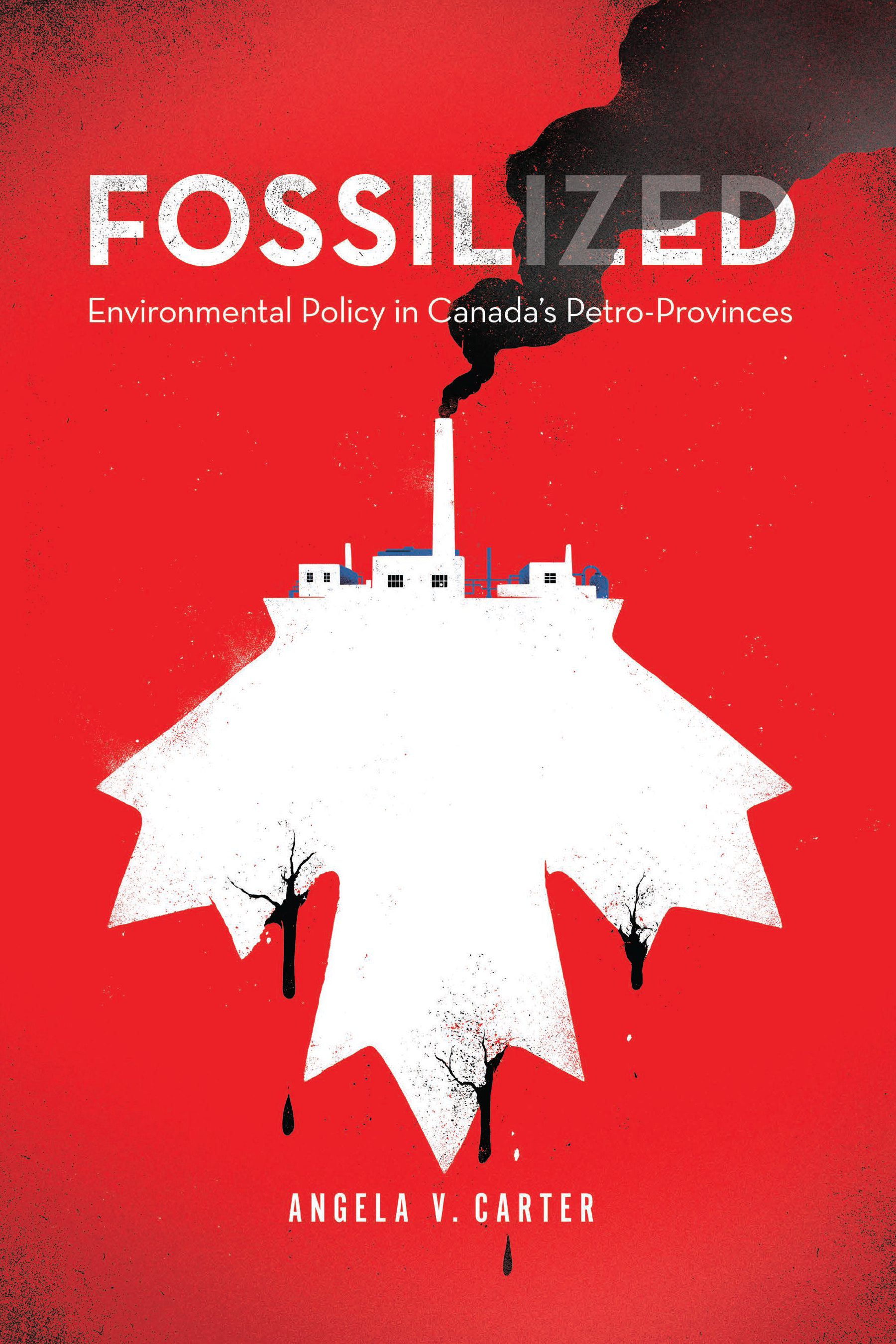
Dr. Angela Carter
Associate Professor, Department of Political Science (cross-appointed to the Department of Geography), Memorial University of Newfoundland and Labrador & Senior Associate, International Institute for Sustainable Development (IISD)
Climate emergency, climate crisis, environmental politics, environmental policy, politics and policy of climate change, oil and gas, fossil fuels
Media
Keeping Fossil Fuels in the Ground: The Future of Climate Policy?
Keynote Talk, Concordia University's "Sustainability and the Climate Crisis Conference," March 17, 2021
Politics and climate change expert discusses Andrew Scheer's climate plan and the future of carbon emissions in Canada
CBC News, June 19, 2019Television
URL: http://www.cbc.ca/player/play/1548102211785/
Angela Carter is a professor and politics and climate change specialist at the University of Waterloo. She joins CBC News Network's Andrew Nichols to weigh in on environmental policy and the controversial government decision to approve the TMX pipeline expansion.
CBC Radio's What on Earth, with host Laura Lynch, October 24, 2021Radio/Podcast
(10:54-20:55 segment)
CBC Radio's The Current, with host Matt GallowayRadio/Podcast
URL: https://www.cbc.ca/radio/thecurrent/over-a-barrel-the-current-for-nov-1-2021-1.6232557
(55:30-1:14:30 segment)
National Observer, December 8, 2021Radio/Podcast
URL: https://www.nationalobserver.com/podcast/race-against-climate-change
(24:19-31:41 segment)
570 News The Mike Farwell Show, June 25, 2019Radio/Podcast
URL: https://www.570news.com/2019/06/25/tuesday-june-25th-2019/
Interview begins at 77:05
What’s the Future of Oil in Canada?
The Walrus, Ask an Expert series, April 19, 2021Print
URL: https://thewalrus.ca/ask-an-expert-whats-the-future-of-oil-in-canada/
A critical step in the net-zero energy transition is modelling the future we’re aiming for
Policy Options, September 16, 2021Online
How to build a better Canada after COVID-19: Launch a fossil-free future
Canada's Energy-Crossroads Election
National Observer, October 18, 2019Online
URL: https://www.nationalobserver.com/2019/10/18/opinion/canada-having-energy-crossroads-election
Written in advance of the 2019 federal election with PhD students Truzaar Dordi and Yonatan Strauch.
Oil is On the Way Out, but NL is Going All-In
The Independent, May 3, 2019Online
URL: https://theindependent.ca/2019/05/03/oil-is-on-the-way-out-but-nl-is-going-all-in/
UBC Press
October 15, 2021
9780774863537
Winner of the 2021 Donald Smiley Prize awarded to the best book published in English or French in a field relating to the study of government and politics in Canada by the Canadian Political Science Association.
Thanks to increasingly extreme forms of oil extraction, Canada’s largest oil-producing provinces underwent exceptional economic growth from 2005 to 2015. Yet oil’s economic miracle obscured its ecological costs. Fossilized traces this development trajectory, assessing how the governments of Alberta, Saskatchewan, and Newfoundland and Labrador offered extensive support for oil development, and exploring the often downplayed environmental effects of extraction.
At the height of the boom, these oil-dependent provinces undermined their environmental policies or let them decay to boost production. Angela Carter investigates overarching institutional trends, such as the restructuring of departments that prioritized extraction over environmental protection, and identifies regulatory inadequacies related to environmental assessment, land-use planning, and emissions controls. Her detailed analysis situates these policy dynamics squarely within the historical and global context of late-stage petro-capitalism and growing neoliberalization of environmental policy.
Fossilized reveals a country out of step with the transition unfolding in response to the climate crisis. As the global community moves toward deep decarbonization, Canada’s petro-provinces have intensified oil production, intertwining their fate ever more closely with fossil fuel extraction – at great ecological and economic risk.
“Policy Pathways to Carbon Entrenchment: Responses to the Climate Crisis in Canada’s Petro-Provinces”
Published by Studies in Political Economy
September 22, 2018
This paper examines the diverse policy strategies that Canada’s largest oil-producing provinces have used to protect their oil sectors from constraints on emissions. Building from the literature on Canada’s staples/carbon trap, the paper explores how, over the most recent oil sector boom and bust period, Newfoundland and Labrador and Saskatchewan moved towards, but then avoided, constraining oil sector emissions. At the same time, Alberta implemented ostensibly pioneering climate policies but ultimately permitted significant emissions growth from the tar sands industry. The paper explains this variation by reviewing major institutional, interest group, and ideational conditions in each province, emphasizing the importance of non-oil interests contesting the oil sector and dominant notions of staples-led economic development.
URL: https://www.tandfonline.com/doi/abs/10.1080/07078552.2018.1492083?journalCode=rsor20
Biography
Dr. Angela Carter is the Canada Research Chair (tier 2) nominee in Northern Governance and Public Policy and an Associate Professor at the Department of Political Science at Memorial University of Newfoundland and Labrador. Prior to this, she was an Associate Professor at the Balsillie School of International Affairs and Department of Political Science at the University of Waterloo. She is also a Senior Associate at the International Institute for Sustainable Development (IISD). Carter established an interdisciplinary comparative research program focused on environmental policies and politics surrounding Canadian fossil fuel development and on new international approaches to climate policy. She also serves as a member of the Net-Zero Advisory Council, Government of Newfoundland and Labrador. Carter has a PhD from Cornell University, and has been teaching in the field of environmental policy and politics since 2008.
Past Talks
Film screening panel
Beyond Crisis: A Screening and Community Dialogue for Climate Action
Princess Theatre, Waterloo, September 23, 2019
Climate Policy Panel
How well do the Federal Election Parties rank in terms of Climate Change?
University of Waterloo, October 10, 2019
Where Do Ontario Parties Stand on the Environment?
Kitchener, May 3, 2018
Peoples Town Hall on the Trans Mountain Pipeline
Kitchener Public Library, Central Branch, July 12, 2018
Rise for Climate, Jobs, and Justice Waterloo Region
Waterloo Town Square, September 8, 2018
Canada, Oil and World Politics
Balsillie School of International Affairs, February 27, 2019
Green New Deal Town Hall
St. Andrew’s Presbyterian Church, Kitchener, June 19, 2019
Pipelines, Tar Sands and the Climate
University of Waterloo, June 18, 2019
Research Grants
“Mapping the Power of the Carbon-Extractive Corporate Resource Sector”
Organization: Social Sciences and Humanities Research Council of CanadaDate: June 1, 2015
Details:
Partnership grant, led by William Carroll (University of Victoria) and Shannon Daub (Canadian Centre for Policy Alternatives, BC)
"The Politics of Leaving Fossil Fuels in the Ground: Building and Testing Comparative Theory in Major Producing States"
Organization: Social Sciences and Humanities Research Council of CanadaDate: June 1, 2018
Details:
Principal investigator, Insight Development Grant


